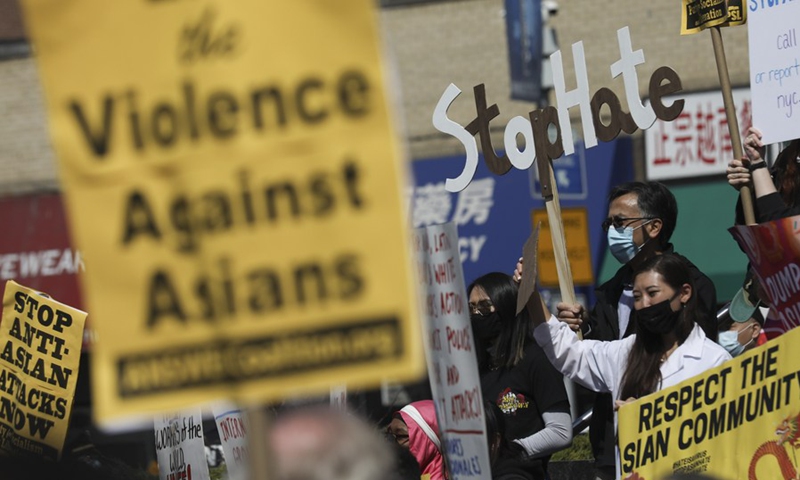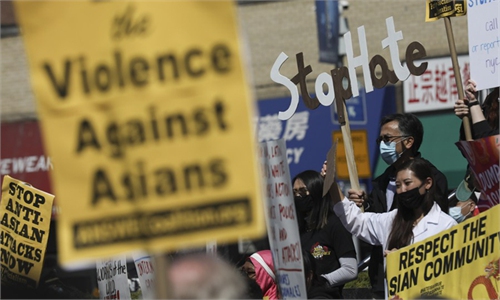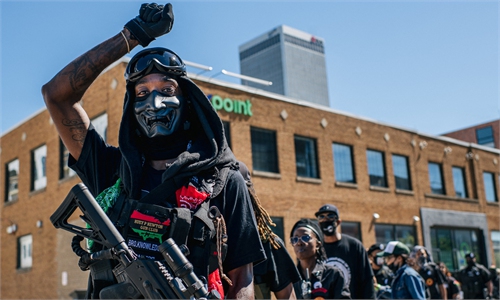
People attend a rally against racism and violence on Asian Americans in Flushing of New York, the United States, March 27, 2021.(Photo: Xinhua)
Editor's Note:Since the pandemic began, discrimination against Asian Americans has been spreading faster than COVID-19 virus. The discrimination is a microcosm of the racism that exists in the US in a comprehensive, systematic and continuous manner. Why is racism so entrenched in America? Why has a country that prides itself on being the beacon of democracy and human rights neglected the human rights of minorities for so long? Why has it done so while often make groundless accusations, demonizing and scapegoating rhetoric against other countries in the name of human rights? The Global Times selected views that some experts expressed at an online event organized on the sidelines of the 47th session of the UN Human Rights Council on Tuesday. The event was hosted by the United Nations Association of China, Beijing.
Systematic racial discrimination
Huang Huikang, former ambassador of China to Malaysia and former director-general of Department of Treaty and Law, Ministry of Foreign Affairs of China
"White supremacy" is deeply rooted in American society. Many senior officials and policy advisers in the previous Trump Administration believed in "white supremacy." In fact, the US has a long history of racial discrimination in its 244 years of history, ranging from the genocide of Native Americans in the early years, to the enslavement of black people, to the persecution of Chinese laborers in the late 19th century. This went further to the recent violent execution by a white police of an African American, George Floyd.
Historically, the US has experienced large-scale and sustained anti-Chinese events. The infamous Chinese Exclusion Act of 1882 was the first racial discriminative immigration law passed in the US against a particular ethnic group. This act authorized the US government to suspend Chinese immigration, resulting in the tragedy of a large number of Chinese laborers in the western US being permanently separated from their families in China. It wasn't until 2012 that the US House of Representatives passed a bill to issue a formal public apology for the brutal legislation of the act. It seems that the legacy of racial discrimination against Chinese Americans is still strong today.
Legally, the serious lack of relevant legislation is a major problem. The long-standing legislative inaction of the US government has been an important reason for the growing racial discrimination and ethnic hate crimes. As a State Party to the 1965 Convention on the Elimination of All Forms of Racial Discrimination, the US has not only failed to fulfill its obligation under the convention, but also has not taken effective measures to eliminate its domestic systematic racial discrimination. While acceding to the convention, the US made a reservation declaring that this convention is not self-executing, and could not be cited as legal basis for claiming equal rights in US courts. The US further made a reservation under the guise of freedom of speech against Article 4 of the convention, which explicitly prohibits incitement to racial discrimination and the dissemination of expressions of racial discrimination. The UN has repeatedly reminded the US that its reservations are incompatible with the object and purpose of the convention, and urged it to withdraw or modify the reservations in question, which the US has ignored.
Intentionally political maneuver
Liang Yabin, an associate professor, Institute for International Strategic Studies, Party School of the Central Committee of CPC
Hate crimes and attacks on Asians and Asian Americans have significantly increased since the beginning of the COVID-19 pandemic. Research has shown that the rise of anti-Asian racism could be significantly contributed to the unreasonable political maneuver by the American Politicians, especially former president Donald Trump. The term Trump used in his twitter was intentionally referring to the coronavirus as the "Chinese virus." This has violated the basic requirement of the WHO to name a disease or virus. No country or place name should appear in the naming process. So, the use of racial and ethnic terms to describe the coronavirus has been the main contributor to the record-breaking level of severe racism against Asian Americans. The inflammatory online rhetoric about COVID-19 from political leaders, including Trump, definitely has led to violence against Asians, no matter what nationality he or she holds.
US government's inaction
Tang Yanlin, a professor from School of International Economics and International Relations, Liaoning University
The lack of willingness of the US government has led to systemic racism remaining uncorrected for a long time. This is due to the long-term governance deficit of the US government, which does not put the human rights of all people at the core of human rights governance, and ethnic minorities have been marginalized for a long time. American Indians, African Americans, Mexicans and Chinese, Japanese and Korean Americans all suffer chronic discrimination, for example.
It also stems from the institutional deficit in the field of legislation and law enforcement in the US. According to Human Rights Now (HRN), a Tokyo-based international human rights NGO, up to now, there is no nation-wide standard for what constitutes a hate crime, and reporting by local police departments remains voluntary. Three states in the US continue to not have any form of hate crime statute at all. The US government has also defined discrimination based on intent rather than the Committee on the Elimination of Racial Discrimination's standard, which focuses on disparate impact. This creates a high burden of proof. And current US legal standards define the intent element narrowly, leaving out forms of discrimination that do not appear "hateful" but can still motivate violence.
The legal system in the US does not draw a clear line between free speech and hate speech. Some people abuse freedom of speech to spread racial remarks and use racism as a political tool, and there is a lack of government control in this aspect.
Experts' recommendations
The US should shoulder responsibilities on promoting genuine equality among all races and ethnicities, through policy and programs. It should also reject all expressions of racist hate speech and discriminatory rhetoric, in particular by officials and public figures, and stop disseminating misrepresented and misguiding information and politicizing COVID-19 to avert criticism of their own misleading anti-pandemic policies. It should further reform its legal system to respond to the serious human rights violation of minorities, and define the difference between freedoms of speech and hate speech.
We recommend the founding of an independent international commission of inquiry to establish the facts and circumstances relating to the systemic racism, violations of international human rights law and abuses against Asians and Asian descents in the US.
We also urge a Special Rapporteur on contemporary forms of racism, racial discrimination, xenophobia and related intolerance to pay a fact-finding visit to the US. This should assist in identifying the root causes and make recommendations to the US government and submit reports to the UN Human Rights Council.
We encourage UPR and other human rights mechanisms, including special procedures, working groups, forums, advisory committee and treaty bodies, within their mandates, to pay attention to the deeply entrenched and continuous scourge of racism in the US and other countries with a racist history including Canada and Australia, and report its actions taken in connection with the problem in its regular report to HRC.
We recommend the HRC to seize of the matter under relevant agenda items of its regular sessions, and take actions to prevent the escalation of racism, racial discrimination, xenophobia and related intolerance in the US.
Lastly, the international community should encourage the US and other countries which have a history of genocide and racism against indigenous people and other minorities, including Canada and Australia, to promote cultures of peace and respect. They should put laws and policies in practice to oppose white suprematism of all kinds - including on social media.


